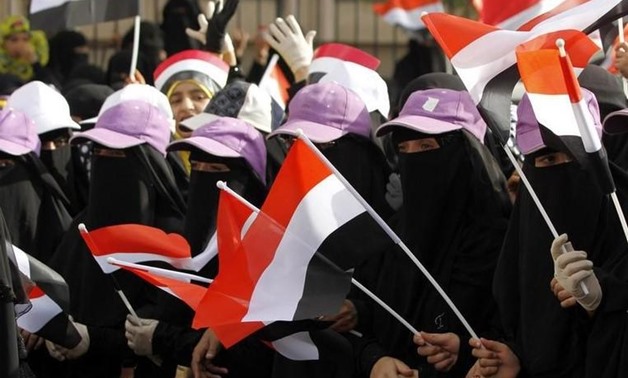
Women wave flags of Yemen during a demonstration by pro-government protesters in Sanaa August 24, 2014. REUTERS/Mohamed al-Sayaghi
CAIRO - 7 October 2018: Cooperation with the United Nations Office for the Coordination of Humanitarian Affairs (OCHA) in Sanaa and Office of the United Nations High Commissioner for Human Rights (OHCHR) is taking place to broker the liberation of 16 female protesters who were kidnapped by Houthi militias on Oct. 6.
President of Inqath, a Yemeni youth movement, and member of the General People’s Congress, Noura al-Garwi, criticized the UN role in Yemen, telling Egypt Today that many reports on human rights violations committed by Houthis have been submitted to the OCHA and accusing the entity of being biased towards the Iran-backed militias.
Garwi said that Houthis assaulted Yemeni women with electric shock batons as the women were protesting harsh living conditions due to civil war. Reuters reported that all the abducted female students were freed after signing a pledge not to take part in demonstrations again.
Garwi added that she herself was detained along with 70 women during protests against Houthis and that they were tortured and beaten. Responding to the arrest and death threats to female demonstrators made by member of the Houthi supreme political council Hussein al-Oza, Garwi affirmed that the militias “executed” a 22-year-old female protester called Amal Matar al-Emeisy.
The activist affirmed that such acts will not deter Yemeni women from protesting against the militia that has put the people in poor economic conditions as salaries of public and civil service employees have been stopped for two years. Also, citizens have been using cardboard papers and wood to light fire due to the hike of gas prices while women are more likely to give birth on the streets.
In 2011, a humanitarian crisis broke out in Yemen as armed opposition toppled late Yemeni President Ali Abdullah Saleh and Houthis ousted elected President Abdrabbuh Mansour Hadi in 2015, triggering the intervention of a Saudi-led coalition which had launched several airstrikes on Houthi locations.
The militia controlled Hodeidah port in Bab al-Mandab Strait, inhibiting the entry of humanitarian aid to Yemenis until earlier 2018. Starvation, risk of cholera spread, and armed confrontations are on top of the life-threatening dangers facing citizens in the conflict-torn country.
Additional Contribution by Noha El Tawil

Comments
Leave a Comment